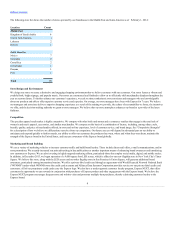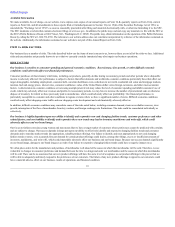Express 2013 Annual Report Download - page 17
Download and view the complete annual report
Please find page 17 of the 2013 Express annual report below. You can navigate through the pages in the report by either clicking on the pages listed below, or by using the keyword search tool below to find specific information within the annual report.
Table of Contents
register our trademarks or purchase or license the right to use the relevant trademarks or logos in these jurisdictions could limit our ability to penetrate new
markets in jurisdictions outside the United States.
Litigation may be necessary to protect our trademarks and other intellectual property rights, to enforce these rights, or to defend against claims by third parties
alleging that we infringe, dilute, or otherwise violate third-party trademark or other intellectual property rights. Any litigation or claims brought by or against
us, whether with or without merit, or whether successful or not, could result in substantial costs and diversion of our resources, which could have a material
adverse effect on our business, financial condition, results of operations, or cash flows. Any intellectual property litigation or claims against us could result in
the loss or compromise of our intellectual property rights, could subject us to significant liabilities, require us to seek licenses on unfavorable terms, if
available at all, prevent us from manufacturing or selling certain products, and/or require us to redesign or re-label our products or rename our brand, any of
which could have a material adverse effect on our business, financial condition, results of operations, or cash flows.
Our substantial indebtedness and lease obligations could adversely affect our financial flexibility and our competitive position.
We have, and we will continue to have, a significant amount of indebtedness. As of February 1, 2014, we had $199.2 million of outstanding indebtedness
(net of unamortized original issue discount of $1.7 million). Our substantial level of indebtedness increases the risk that we may be unable to generate cash
sufficient to pay amounts due in respect of our indebtedness. We also have, and will continue to have, significant lease obligations. As of February 1, 2014,
our minimum annual rental obligations under long-term lease arrangements for 2014 and 2015 were $187.3 million and $155.8 million, respectively. Our
substantial indebtedness and lease obligations could have important consequences and significant effects on our business. For example, they could:
•increase our vulnerability to adverse changes in general economic, industry, and competitive conditions;
•require us to dedicate a substantial portion of our cash flow from operations to make payments on our indebtedness and leases, thereby reducing the
availability of our cash flow to fund working capital, capital expenditures, and other general corporate purposes;
•limit our flexibility in planning for, or reacting to, changes in our business and the industry in which we operate;
•restrict us from exploiting business opportunities;
•make it more difficult to satisfy our financial obligations, including payments on our indebtedness;
•place us at a disadvantage compared to our competitors that have less debt and lease obligations; and
•limit our ability to borrow additional funds for working capital, capital expenditures, acquisitions, debt service requirements, execution of our
business strategy, or other general corporate purposes.
In addition, our existing credit agreements and the indenture governing the 8 3
/4% Senior Notes ("Senior Notes") contain, and the agreements evidencing or
governing any future indebtedness may contain, restrictive covenants that will limit our ability to engage in activities that may be in our long-term best
interests. Our failure to comply with those covenants could result in an event of default which, if not cured or waived, could result in the acceleration of all of
our indebtedness.
Our indebtedness may restrict our current and future operations, which could adversely affect our ability to respond to changes in our business
and to manage our operations.
Our existing credit agreement and the indenture governing the Senior Notes contain, and agreements governing any future indebtedness may contain, financial
restrictions on us and our restricted subsidiaries, including restrictions on our or our restricted subsidiaries' ability to, among other things:
•place liens on our or our restricted subsidiaries' assets;
•make investments other than permitted investments;
•incur additional indebtedness;
•prepay or redeem certain indebtedness;
•merge, consolidate or dissolve;
•sell assets;
•engage in transactions with affiliates;
•change the nature of our business;
•change our or our subsidiaries' fiscal year or organizational documents; and
17
























